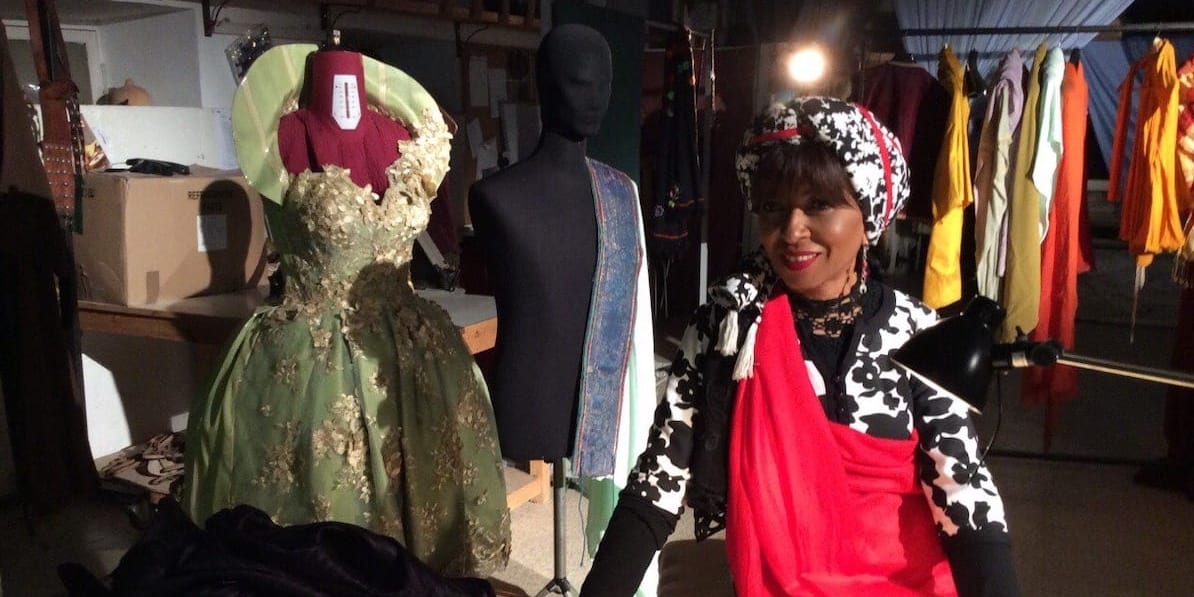Rabia Ben Barka in conversation with Rivka Jacobson (Below full translation from English to Arabic by Sabri Malik)
ربيعة بن بركة في حديث مع ريفكا جاكوبسون
The splendid Roman theatres at Leptis Magna and Sabratha stand desolate, longing for performances of quality to make use of their magnificent stages. This is Libya.
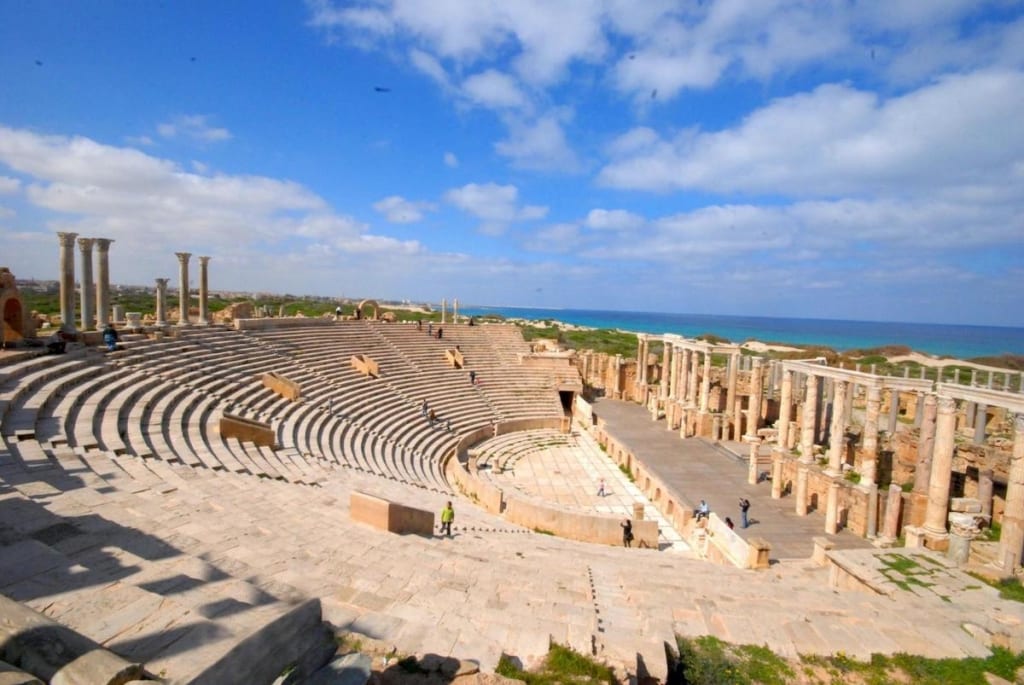
Exposure to Western cultures has unlocked aspirations for modern entertainment– cinema, theatre and art galleries. I spoke to several Libyans, keen and ready to open their country to Western cultural and economic ideas, to build on what they have and not at the expense of what they cherish.
Not much culture blossomed in the desert. ‘The 42-year rule of Colonel Gaddafi took the country backwards by 100 years’ says Wael Shater, an ambitious entrepreneur. Since the fall of Colonel Gaddafi, Libya faced years of political vacuum, lawlessness and power struggle. It now feels like a true spring. ‘The UN has mandated an American diplomat, Ms Stephanie Williams, to oversee Libya’s transition to democracy. She achieved in less than two years what many senior politicians and diplomates failed to accomplish in years – a road map that was presented and is being followed. On the 24th of December 2021, Libya will hold a general election. The aspiration of many Libyan, especially the young generation, is for a peaceful and stable Libya’ says Ahmed Shebani, founder of The Democratic Party (Libya). ‘People are ready for change. Now is the time, we cannot afford to wait,’ adds Wael.
Rabia Ben Barka explains ‘I became the first Libyan fashion designer recognized for my unique style by modernizing our traditional costumes.’ She has been inspired by tradition, the desert’s magnificent hues and shapes, and of course, years of education in art and fashion schools in the West.
“Her family were the Kennedys of Libya,” said a friend. He was talking about Rabia Ben Barka, a Libyan top fashion designer with numerous international prizes to her name. She is a woman who understands the Western culture and appreciated her country’s conservative traditional dress codes. We spoke over the telephone, exchanged emails and WhatsApp messages. Her voice is low, and her words are measured. Her openness is rather refreshing. She is a woman who has witnessed political and economic turmoil and experienced some devastating blows. Her unwavering optimism and belief in her country’s better future sustain her energy. I was encouraged by talks of a better future. A future where Libya embraces a blending of the traditional and the modern cultures, fashions, cinemas and theatres and, above all, stability and tolerance. This is a tall order for a country that has known tyranny and fundamentalism.
Childhood
She was the fourth daughter to Fatitima (née Nga) and Mohamed Mansour, hence her name Rabia – ‘Rabha’ is fourth in Arabic. They were four daughters: one died in infancy, and three brothers. From an early age, she and her sisters attended an English school in Tripoli, that is until she reached puberty: ‘it may be the appearance of breasts or a first period’ she says with a hint of coyness. At this point, I guess, like graduation from primary school to High School, tradition dictates schooling by Arfia that is a female teacher coaching young women to become good Muslim wives. ‘Respected young women were not allowed to be seen in public.’ Explains Rabia.
Rabia’s parents, although adhering to tradition, sent their children to England for their summer vacations. They stayed on a farm in Surrey: ‘It was Mrs Price, I think’ she recalls. ‘We learnt to ride horses and she took us to London and other places. We had English classes and lots of fun’ she recalls. ‘I enjoyed horse riding so much that my father bought me two horses when I came back to Libya.’ The family appreciated Western culture. Rabia recalls her father talking about the performance of Verdi’s Aida he saw in Teatro dell’Opera di Roma in 1957.
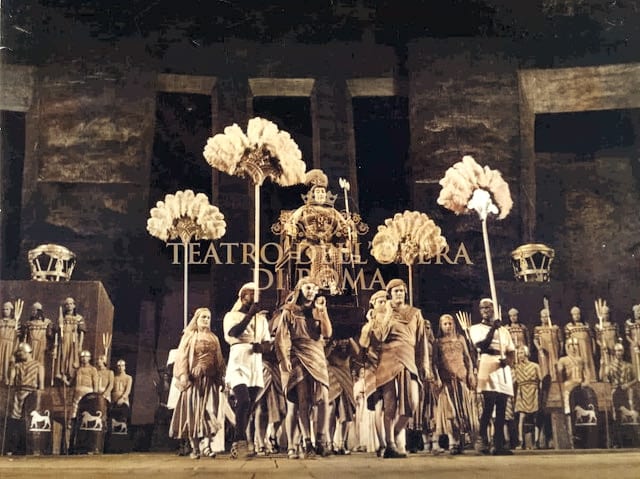
Childhood for Rabia was a happy period despite the fact she and her sibling were under the eagle eye of her mother’s grandfather who ‘never smiled, and everyone was scared of him. He was very tall and very strict. Because his son was too busy working, he took over the duty of ensuring that there was discipline at home. He lived to a 100’, she says with a chuckle.
Business acumen
Her maternal grandfather was the first Libyan to attend an international trade fair in the state of Texas in 1921. He was young, talented and ambitious. He had seven factories ranging from canned tuna-fish, exported to Spain, to the famous pasta factory, di Stefano, which he co-founded with an Italian partner, in Tripoli. Her uncle, Mohamed Nga was the owner of Uaddan Hotel & Casino, referred to as the Waldorf Astoria of Tripoli. It was opened in 1936. It contained a casino and a 500-seat theatre.
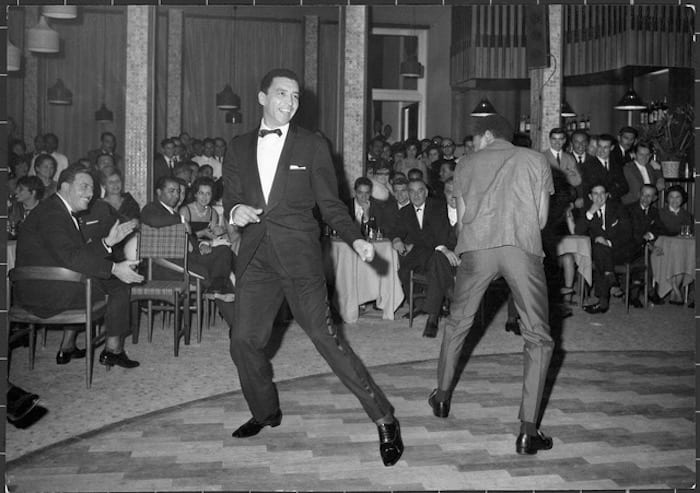
It was Mussolini’s Italy that controlled Libya from 1911 to the end of 1942. Rabia’s mother, tall, elegant and beautiful, benefitted from early Italian education. She was the one who would discuss and vet designs that would then be implemented in the textile factory. She would advise on colours and the width of stripes that defined women’s fashion in Libya for many years. Rabia speaks tenderly of her mother, who died in 2012, the year the militia set her textile factory ablaze. ‘Everything I’ve ever had went up in smoke. All my pictures, my design books, fabric, machinery – the lot.’ She gets emotional and needs a brief break ‘even now, so many years since the fire I become very emotional when I try and talk about it’ Rabia says almost choking on her words. Despite it all, she has now decided to rebuild her life. She lost her father this year. A new chapter has to begin. A National Unity Government is in power as of March 2021, and it looks promising. She hopes to design for the public and the theatre.
Rabia is reluctant to make political comments ‘I am an artist. I have nothing to do with politics.’ she says. Yet the political turmoil in Libya had a devastating effect on her and her family’s life. She cannot but despair about the last ten years of lawlessness in Libya, since the 2011 uprising that led to the overthrow and eventual killing of Muammar Gaddafi. She agrees that he withheld the country from progress. The chaos and insecurity for the citizens were not what they prayed for. In 2012 while nursing her dying mother, the local militia burnt razed her textile factory to the ground. She lost both in one year. Now she is ready to face new challenges.
The coup d’état in 1969 by Colonel Gaddafi put an abrupt end to much of the family’s business enterprises and properties. The nationalization of factories and houses they owned, flung the family into an existence heaped with unfamiliar hardship. Rabia was young and very determined. Undeterred by the draconian laws imposed by the so-called Socialist new leader, she tirelessly challenged the new bureaucracy, demanding the return part of her family’s fabric factory to set up her own fashion and design business. She was fortunate. Gaddafi’s daughter Aisha loved her style and helped her return from Rome to Tripoli. Soon she was the first family’s fashion designer. ‘I got back one-third of my father’s fabric factory, in 1991, and that’s when I started to make it my workplace to start my fashion business. I set to work immediately. It was a little workshop. I had that grow to the level I was making mass production for the police and army uniform as well as fashion for men and women.’ She says with modest pride.
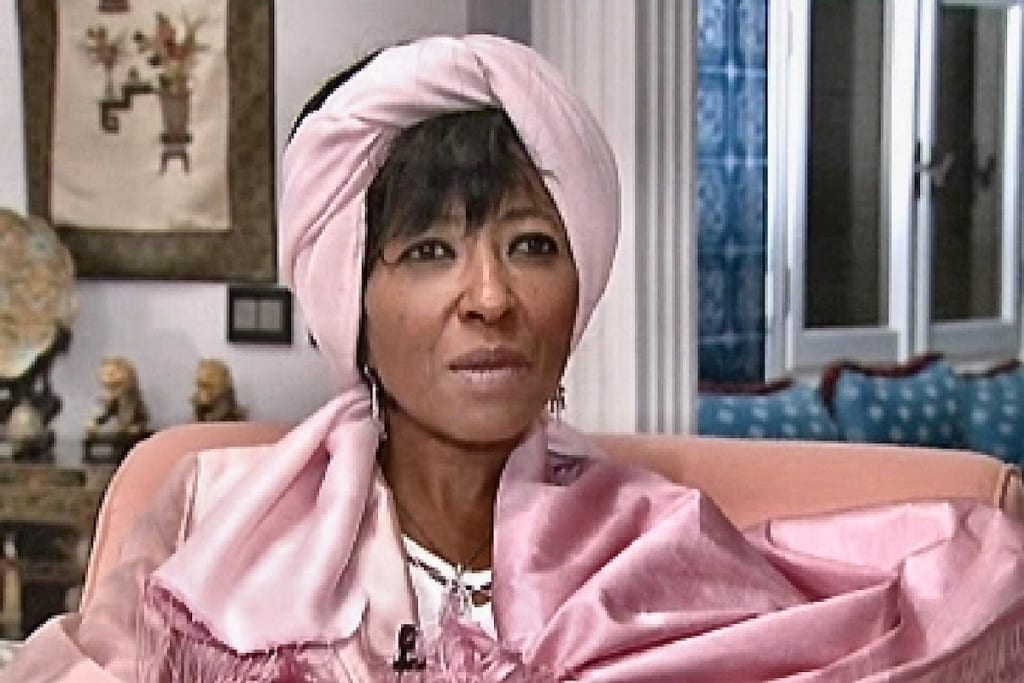
During the years she fought for her right to set up her textile factory, she carried on with her studies in leading fashion houses in Italy. She also took part in fashion competitions. At the age of 26, she won the top prize in Egypt’s top fashion show contest. It fuelled her with greater energy to pursue her dreams as a fashion designer in a country that had no history of fashion designers.
Rabia Ben Barka’s textile factory, the hub of modern creativity, rapidly developed and eventually employed 400 people. Most were young and talented aspiring designers and models’ she recalls in a warm voice. ‘I was mentoring young girls and boys as fashion designers and tailors. I was the first to create in Libya Fashion Models. The girls and boys showcased my fashion inside Libya and abroad. We received many awards.’ Her factory had also responsible for ‘mass productions for military and police uniforms.’ There was hardly any theatre during the 42 years of Gaddafi’s rule. The little that there was, she designed the costumes that were required.
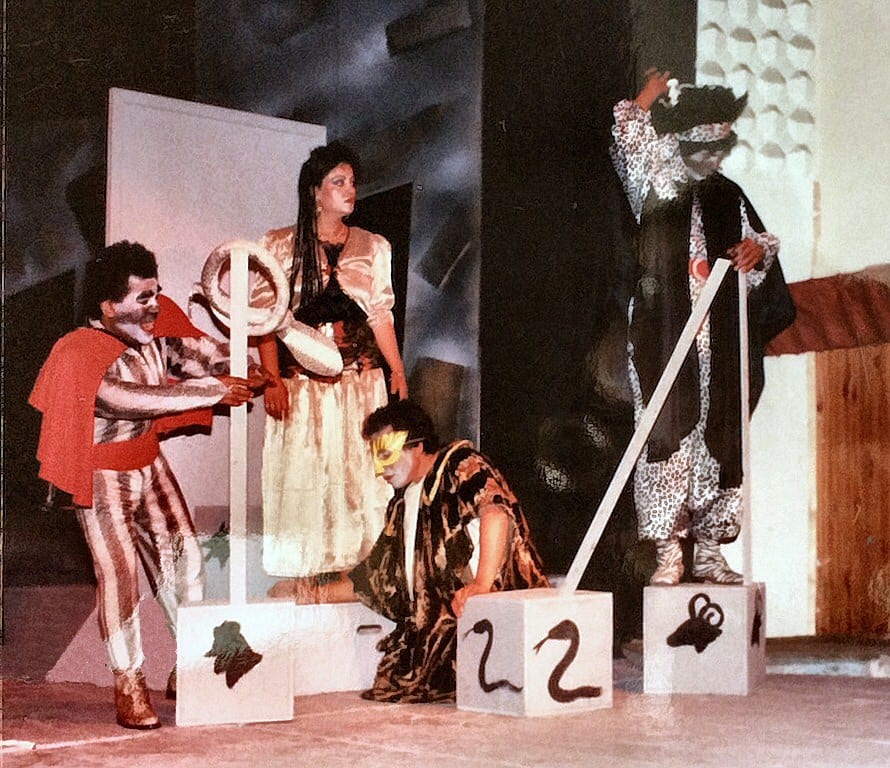
Her work is a blend of the traditional and the modern, mirroring her education in the West and roots in the East. She designs for women and men. Her style is bold, flamboyant, yet elegant. Her colours range from exotic tones to pale shades of pink and ivory, interwoven with complementary tones.
She was hailed Libya’s Ambassador of Fashion and Design. Gaddafi, his wife and many African countries leaders were among her clients. Her last fashion show in Europe was just before the West helped topple Gaddafi. She was an honoured guest in the Lviv Fashion Week in Ukraine on 25 October 2009. Ben Barka presented her new Spring/Summer 2010 collection entitled Flowers of the Desert. The title and period may symbolise an overdue new beginning.
ربيعة بن بركة في حديث مع ريفكا جاكوبسون
يشهد المسرحان الرومانيان الرائعان في كل من مدينتي لبدة و صبراتة الآثاريتين حالة من الهجر و الإهمال عسى أن تبعث فيهما الحياة يوما ما فتقام فيهما العروض المسرحية التي تتناسب مع عظمتهما . إنها ليبيا .
لم تزهر الصحراء بكثير من الثقافة ، فسنين حكم القذافي الإثنين و الأربعين أعادت ليبيا مئة سنة للوراء على حد قول رجل الأعمال الطموح وائل الشاطر . منذ سقوط العقيد القذافي و اجهت ليبيا سنين من الفراغ السياسي و غياب القانون و الصراع من أجل السلطة أما الآن فينبعث شعور بربيع حقيقي قادم . لقد فوضت الأمم المتحدة ديبلوماسية أمريكية هي السيدة ستيفاني ويليامز لتشرف على إنتقال ليبيا إلى الديمقراطية . لقد نجحت السيدة ويليامز في تحقيق في أقل من سنتين ما قد فشل في تحقيقه ساسة و ديبلوماسيين كبار في سنوات عديدة ، فلقد أشرفت على إعداد خارطة طريق يقوم الليبيون حاليا بإتباعها . يقول السيد أحمد الشيباني مؤسس الحزب الديمقراطي ( ليبيا ) أنه سوف تجري في 24 ديسمبر 2021 إنتخابات عامة و إن آمال الكثير من الليبيين – خصوصا الشباب منهم – متعلقة بأن تعيش ليبيا في سلام و إستقرار . أما وائل فيقول بأن الليبيين جاهزون الآن للتغيير ، فلا مجال للإنتظار ، و ليس لدينا وقت نضيعه .
لقد أدى الإنفتاح على الثقافة الغربية إلى إنطلاق طموحات كثيرة للترفيه الحديث في السينما و المسرح و صالات الرسم . فلقد تحدثت مع كثير من الليبيين المتعطشين لأن تنفتح بلادهم على الثقافة الغربية و على الأفكار التجارية . فهم يريدون أن يبنوا على ما يملكونه و لكن ليس على حساب ما يحبون .
تقول ربيعة بن بركة : لقد كنت أول مصممة أزياء ليبية يعترف بأسلوبها الفريد في تحديث أزيائنا التقليدية . إنها تتلقى إلهامها من هضاب الصحراء و أشكالها و من سنوات قضتها في دراسة الفن و الموضة في مدارس الغرب .
يقول صديق أن عائلة ربيعة هي بمثابة عائلة كندي الليبية . و يضيف أن ربيعة الحائزة على جوائز عالمية عديدة في تصميم الأزياء تفهم الثقافة الغربية و في نفس الوقت تقدر قيمة الحفاظ على أزياء بلادها . لقد تحدثت مع ربيعة عبر الهاتف و تبادلنا الرسائل الإلكترونية و رسائل الوتسآب . إن صوتها يأتي منخفضا و تأتي كلماتها منضبطة . إن شخصيتها المنفتحة لأمر يستساغ حقا . إنها إمرأة قد شهدت إضطرابات سياسية و إقتصادية كثيرة و تلقت صدمات عميقة . و لكن روحها التفاءلية و إيمانها بمستقبل أفضل لبلادها هما ما يعطيها القدرة على الإستمرار في العطاء . لقد سررت جدا بحديثها عن مستقبل أفضل تمزج فيه ليبيا بين الثقافة الحديثة و الثقافة التقليدية في الموضة و السينما و المسرح ، و فوق ذلك كله عبرت عن إيمانها بالإستقرار و التسامح . إن هذه الآمال تبدوا بعيدة المنال في بلاد قد عرفت الطغيان و الأصولية .
سنين الطفولة :
كانت ربيعة الطفلة الرابعة لفاطمة إنقا و محمود منصور . لقد ماتت إحداهن في الصغر . و لربيعة ثلاثة إخوة . منذ نعومة أظافرها إرتادت ربيعة مع أخواتها مدرسة إنجليزية في طرابلس إلى أن وصلت الحلم . فلقد أدى ” بروز نهديها ” إلى أن تتوقف عن الدراسة في المدرسة المختلطة . إنه أمر يشبه التخرج من المدرسة الإبتدائية و الإنتقال إلى المدرسة الثانوية . إن التقاليد في ليبيا تحتم على العريفة ( المدرسة الأنثى ) أن تعلم الطفلات كيف يصبحن زوجات مسلمات جيدات . تقول ربيعة أن البنات المحترمات لا يرون خارج البيت في عرف الناس .
على الرغم من أن والدي ربيعة كانا يتبعان تقاليد مجتمعهما إلا أنهما بادرا بإرسال أبنائهم و بناتهم للدراسة في إنجلترا خلال العطلات الصيفية . فكان هؤلاء يقطنون في مزرعة في مقاطعة صاري . تقول ربيعة : كان إسم صاحبة المزرعة السيدة برايس . تعلمنا هناك ركوب الخيل . و قد كانت السيدة برايس تأخذنا لزيارة لندن و أماكن غيرها . و درسنا اللغة الإنجليزية . لقد كانت أياما سعيدة حقا . و لقد ولهت بركوب الخيل مما جعل أبي يشتري لي حصانين عند عودتي لليبيا . لقد كانت عائلتي تقدر الثقافة الغربية ، فأنا أذكر على سبيل المثال أن أبي كان يتحدث كثيرا بإعجاب عن عرض أوبرا فيردي عايدة الذي شاهده في مسرح الأوبرا في روما سنة 1957 .
لقد كانت طفولة رابعة سعيدة على الرغم من أنها و إخوتها و أخواتها كانوا دائما تحت رقابة جد أمها الذي ” لم يكن ليبتسم قط ” و كان الجميع يخافونه . لقد كان رجلا طويل القامة و صارما جدا . ولأن إبنه كان دائم الإنشغال في عمله كان هو مصدر الإنضباط في البيت . لقد عاش حتى سن المئة تقول رابعة ببعض من الرجفة .
الحس التجاري الثاقب :
لقد كان جد ربيعة من امها أول ليبي يرتاد المعرض الدولي في مدينة تكساس سنة 1921 . كان شابا ذو مواهب و طموح يملك 7 مصانع من بينها مصنع لتعليب التونة إستورده من إسبانيا و مصنع للمكرونة الشهيرة دي سنغاو الذي أسسه مع شريك إيطالي في طرابلس . أما عمها محمد إنقا فقد كان صاحب فندق الودان والذي كان بوالدورف أستوريا الطرابلسي و الذي أفتتح سنة 1936 . و كان يضم كازينو و مسرحا يتسع لخمسمئة من الرواد .
كانت إيطاليا الموسيلينية تسيطر على زمام الأمور في ليبيا من سنة 1911 إلى سنة 1942 . كانت أم ربيعة إمرأة فارهة الطول و جميلة و أنيقة قد حازت على تعليم إيطالي . كانت تناقش التصاميم و تعطيها موافقتها قبل أن يجري تصنيعها في مصنع الملابس . كانت تعطي رأيها في ألوان هذه التصاميم و في عرض خطوطها محددة بذلك الموضة النسائية في ليبيا لعدة سنوات . تتحدث ربيعة عن أمها التي توفيت سنة 2012 بكل حميمية ، تلك السنة التي أضرمت فيها إحدى المليشيات النار في مصنع الملابس هذا . تقول ربيعة : لقد إحترق كل شيء أملكه . لقد ذهبت كل تصاميمي و ذهب القماش و الآلات . لقد ذهب كل شيء . تقول ربيعة ذلك بكل ألم و حسرة ، وقد أحتاجت لبعض الوقت كي تهديء من روعها و هي تحدثنا عما حدث .
و تضيف ربيعة قائلة و هي تكاد أن تبكي : بعد مرور كل هذه السنوات على الحريق لا زال الأسى و المرارة يساورانني كلما أتحدث عما حدث . و على الرغم من كل ما حدث لها فقد قررت ربيعة إعادة بناء حياتها . لقد توفي أبوها هذه السنة . إنه فصل جديد يجب أن يبدأ فهناك حكومة وطنية في البلاد منذ شهر مارس 2021 و الأمور تبدو مطمئنة . إن ربيعة تأمل أن تصمم الأزياء للناس و للمسرح من جديد .
إن ربيعة تتردد في الحديث عن السياسة فهي ترى نفسها أنها فنانة ليس لها علاقة بالسياسة . و لكن الفوضى السياسية في ليبيا كان لها تأثيرا مدمرا على حياتها و على حياة عائلتها . و ما كان لها أن تشعر بفقدان الأمل خلال السنين العشرة الماضية من الفوضى و غياب القانون في ليبيا ، أي منذ إنطلاق الثورة في سنة 2011 و التي أدت إلى خلع القذافي ثم قتله . إنها تتفق مع من يقول بأن القذافي قد منع تقدم البلاد ، و أن الفوضى و غياب الأمن لم يكونا ما يصلي من أجله المواطنون . ففي سنة 2012 عندما كانت ربيعة تمرض أمها التي كانت على فراش الموت قامت الميليشيا المحلية بحرق مصنع النسيج الذي تملكه ربيعة كليا . لقد فقدت أمها و مصنعها في نفس السنة . و لكنها الآن جاهزة لمواجهة تحديات جديدة.
و ضع الإنقلاب العسكري الذي قام به معمر القذافي في سنة 1969 حدا فوريا لأغلب أعمال العائلة ، و قد تضمن ذلك الإستيلاء على عقاراتها . فلقد أدى تأميم مصانع و عقارات العائلة إلى صعوبات جمة لم تكن ربيعة معتادة عليها . لقد كانت في مقتبل العمر ذات عزيمة ماضية . فلم تثنها القوانين الظالمة التي سنها القائد الإشتراكي الجديد عن أن تتحدى بكل صرامة البيروقراطية الجديدة مطالبة بإستعادة بعض من ملكية مصنع النسيج للعائلة و أن تمضي قدما في تأسيس عمل خاص بها في الموضة و تصميم الأزياء . لقد كانت محظوظة فقد أحبت عائشة بنت القذافي تصاميمها فساعدتها على العودة من روما إلى طرابلس . و في وقت سريع أصبحت ربيعة أول مصممة أزياء في العائلة . تقول ربيعة بتواضع : لقد نجحت في إسترداد ثلث مصنع والدي للنسيج في سنة 1991 ، و جعلت منه قاعدة لعملي في مجال تجارة الموضة ، و بدأت في العمل على الفور . لقد كان ورشة تعمل بسرعة . و هكذا نمى عملي شيئا فشيئا إلى أن أصبحت أنتج ملابس الشرطة و الجيش الرسمية بأعداد كبيرة ، بالإضافة إلى عملي في الموضة الرجالية و النسائية .
في سن السادسة و العشرين فازت ربيعة بأعلى جائزة للموضة في مصر . وقد زاد هذا الفوز من عزمها على المضي قدما لتحقيق حلمها في أن تصبح مصممة للأزياء في بلاد ليس فيها تاريخيا أي مصممي أزياء .
تطور مصنع نسيج ربيعة بن بركة بسرعة إلى أن بلغ عدد العاملين فيه أربع مئة ، كان أغلبهم من الفتيان و الفتيات ذوي المواهب الطامحين لأن يصبحوا مصممي و عارضي أزياء كما جاء في حديثها الدافيء الذي يستحضر الماضي . تقول ربيعة : لقد كنت أشرف على تعليم الفتيان و الفتيات الموضة في ليبيا . وقد قام هؤلاء بعرض أزيائي في الخارج و قد حزنا على جوائز كثيرة . لم يكن هناك أي مسارح طوال سنين حكم القذافي الإثنين و الأربعين تستحق الذكر ، و لكنني قمت بتصميم الأزياء للعروض المسرحية القليلة التي جرى أداءها .
إن عمل ربيعة خليط من التقليدي و الحديث مما يعكس دراستها في الغرب و جذورها الشرقية في آن . إنها تصمم للنساء و للرجال . إن تصاميمها جسورة و خارجة عن الألوف و لكنها أنيقة دوما . و تعددت ألوان هذه الأزياء فكان بعضها منمق و صارخ بينما كانت الأخرى ذات ألوان هادئة توحي بالوردي أو العاجي مختلط مع إيحاءات أخرى .
تعتبر ربيعة سفيرة الموضة و تصميم الأزياء في ليبيا . كان القذافي و زوجته و كثير من الرؤساء الأفارقة من زبائنها. و لقد كان آخر عرض أزياء لها قد عقد في أوربا قبيل مساعدة الغرب الليبيين في إسقاط القذافي . و قد كانت ربيعة ضيفة الشرف في أسبوع لفيف للموضة في أوكرانيا في أكتوبر 2009 .
قدمت ربيعة مجموعتها الربيعية الصيفية لسنة 2010 بعنوان أزاهير الصحراء . قد يكون في ذلك العنوان رمزا لبداية مرحلة جديدة قد طال إنتظارها .
الترجمة: السيد صبري مالك

